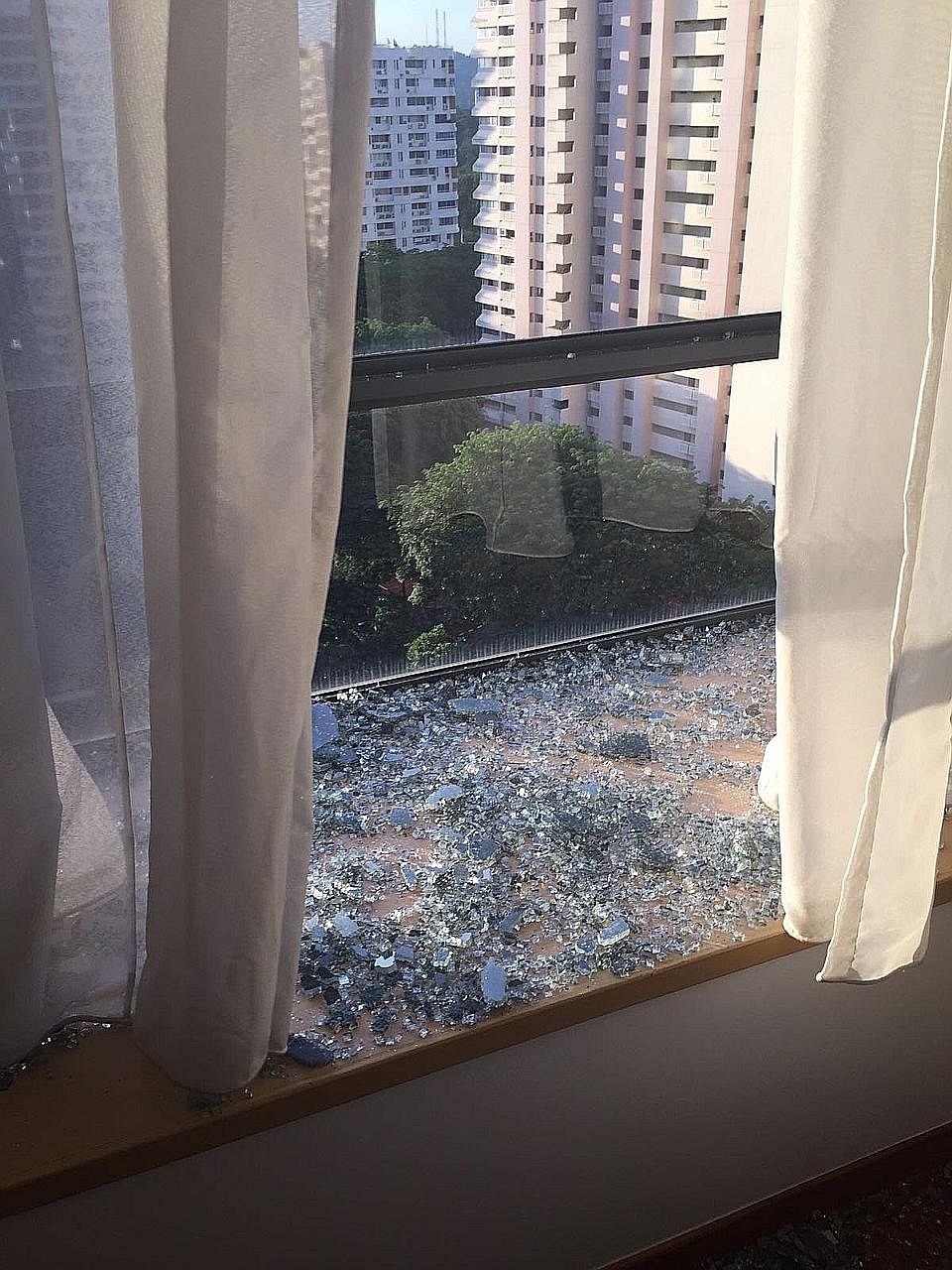A supply chain manager, who wanted to be known only as Mr David, got home from work two weeks ago to find that his bedroom window had shattered, showering broken glass across the room and into his son's cot - though, luckily, the one-year-old was not in it then.
Savills, the company which manages his condominium, The Trizon, told the family that it was a case of spontaneous glass shattering, in which glass toughened by heat breaks on its own.
It was the estate's 12th such incident in five years.
Over the past four years, the Building and Construction Authority (BCA) has received an average of 15 reports on glass shattering per year coming from a total of 25 condos.
After reviewing building regulations on the use of glass in critical areas, it said that from July 2011 buildings must use laminated glass where glass is used as a part or whole of a safety barrier.

-
TYPES OF GLASS
-
TEMPERED GLASS
• Strong but can shatter into small pieces if raw materials used are contaminated.
• Commonly used in coffee tables, shower doors, partitions, doors in malls
• Cost: Around $50 per sq m for 12mm glass
HEAT-STRENGTHENED GLASS
• Treated for a longer time than tempered glass, breakage results in bigger shards.
• Commonly used in building facades
• Cost: Similar to tempered glass
LAMINATED GLASS
• Uses an interlayer to hold two pieces of glass together, preventing the glass from shattering even when broken
• Commonly used in building facades, windows, safety barriers and skylights
• Cost: Around $90 per sq m for 12.76mm glass
This includes barriers at balcony areas, to ensure that broken pieces will be held together if there is spontaneous breakage.
However, these regulations do not apply retrospectively to estates like The Trizon in the Holland Road area, as building plans were submitted before July 2011.
The BCA said: "Prior to July 2011, tempered glass was allowed by BCA to be used as safety barriers because (it) is known for its strength."
But it has a risk of spontaneous shattering, which is caused by the expansion of nickel sulphide crystals in the glass over time.
While such shattering is uncommon, tempered glass can break into small bits.
No one was in the room when Mr David's window shattered, but his niece and nephew, who were in the 15th-floor unit with their domestic helper, heard a crash at around 4.30pm on June 20.
"(They told me) it sounded like a plate shattering, then it felt like a whole shelf of plates fell," said Mr David, 32, who added that other residents are not informed by management when such incidents happen. "Good thing my baby was not in the room at the time. We don't know if the other windows are at risk."
Contractors have since boarded up the opening on the building's facade with plywood. The panel will be replaced with heat-soaked glass, which has been tested to a high temperature, reducing the likelihood of future breakage.
But the management of the condo cannot guarantee there will be no future breakage. Home owners will have to decide if they want to replace all the glass in the building facade after holding a general meeting. Glass experts agree that spontaneous shattering is uncommon.
"It is generally known that metallic nickel contamination of the raw materials for glass manufacturing can combine with sulphur (from furnace fuel) during melting to form a nickel sulphide inclusion," said Mr Ian Lee, operations director of Meng Heng Glass.
"This may cause spontaneous breakage if the glass is subsequently heat-treated," he said.
Mr Gary Lee, business development manager of Singapore Safety Glass, said that inclusion of nickel sulphide is a common reason for such breakages, although this cannot be seen with the naked eye or easily detected by technology.
Other possible reasons are "edge damage or surface damage (of the glass) from handling or installation".
National Safety Council deputy president Fong Kim Choy suggests installing a film on glass barriers at home that can hold shattered glass together if it breaks. "You cannot prevent shattering - it's the nature of glass manufacturing," said Mr Fong. "But what we can do is prevent harm if it shatters."

